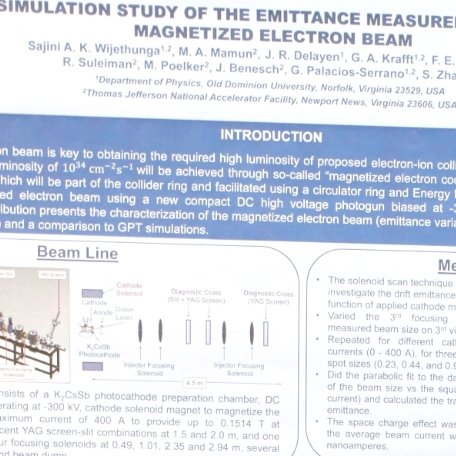Joseph Newton
Sajini Wijethunga
Jefferson Sciences Associates (JSA), the managing and operating contractor of the Thomas Jefferson National Accelerator Facility (Jefferson Lab) for the U.S. Department of Energy's Office of Science, recently announced the award of nine graduate fellowships to doctoral students for the 2019-2020 academic year.
Among those students are two ODU graduates, Joseph Newton and Sajini Wijethunga.
Newton began his graduate studies at the University in 2014 and has been a graduate researcher at the Jefferson Lab since 2016. His thesis topic, "J/Psi Photoproduction Near Threshold," is related to an experiment with Jefferson Lab's upgraded CEBAF Large Acceptance Spectrometer. Newton earned his bachelor's degree in 2014 and a master's in physics in 2015. During that time, he completed undergraduate research projects at Jefferson Lab and Brookhaven National Laboratory in New York.
Wijethunga started her graduate studies at ODU in 2015. During the first year, she worked as a teaching assistant. She earned bachelor's degree in Sri Lanka at the University of Peradeniya in 2015 and her master's in physics at ODU in 2017. In January 2017, she began working with the Jefferson Lab injector group on the upcoming Jefferson Lab Electron-Ion Collider (JLEIC) project, namely on "characterizing and simulating the magnetized electron beam for the ion cooler of the JLEIC." Wijethunga is studying the "space charge effect in Jefferson Lab magnetized electron beam" as part of her Ph.D. dissertation topic.
The other seven award recipients are from Massachusetts Institute of Technology, William & Mary, the University of Virginia, Louisiana Tech University and The Catholic University of America.
The fellowships will support students' advanced studies at their universities and research at the Jefferson Lab. The students' research proposals cover a broad scientific spectrum, including experimental, theoretical and accelerator physics.
"These fellowships provide the opportunity for students to collaborate with scientists and mentors to make research contributions to the scientific program at Jefferson Lab," said Robert McKeown, deputy director for science and technology at Jefferson Lab. "This year's applicant pool reflects the excitement of Jefferson Lab's science program for young researchers."
The Southeastern Universities Research Association (SURA) board of trustees established the fellowship program in 1989. The program, now supported by the JSA Initiatives Fund, contributes to students' research assistant stipends, and additional funds are available for research-related student travel during the fellowship.
All fellowship recipients attend universities that are members of SURA, a consortium of 60 leading research universities. Since the program's inception, 225 fellowships have been awarded to students from 22 SURA member universities.
About the Jefferson Lab:
The Thomas Jefferson National Accelerator Facility (Jefferson Lab) is a U.S. Department of Energy Office of Science national laboratory. Scientists worldwide utilize the lab's unique particle accelerator, known as the Continuous Electron Beam Accelerator Facility (CEBAF), to probe the most basic building blocks of matter - helping us to better understand these particles and the forces that bind them - and ultimately our world.
In addition, the lab capitalizes on its unique technologies and expertise to perform advanced computing and applied research with industry and university partners, and provides programs designed to help educate the next generation in science and technology.





